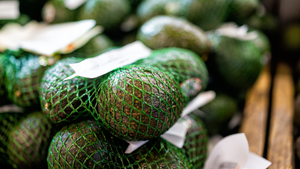NGA, United Fresh partner to maintain fresh produce supplyNGA, United Fresh partner to maintain fresh produce supply
Collaboration to connect independent grocers with fruit/vegetable distributors
March 25, 2020

To help ensure coronavirus-triggered supply disruptions don’t prevent fresh fruit and vegetables from getting to supermarkets, the National Grocers Association (NGA) and the United Fresh Produce Association have teamed up to link produce distributors with retailers.
NGA and United Fresh said Wednesday that they will work with companies — including the foodservice distribution sector — to gauge their retail needs and provide an opportunity to network on business solutions.
NGA represents the retail and wholesale grocers that comprise the independent grocery industry. United Fresh serves companies across all segments of the fresh produce supply chain, including growers, shippers, fresh cut processors, wholesalers, distributors, retailers, foodservice operators, industry suppliers and allied associations.
“The entire food industry has come together incredibly during the coronavirus (COVID-19) outbreak, ensuring that Americans across the country have access to affordable and nutritious food,” NGA President and CEO Greg Ferrara said in a statement. “Our collaboration with United Fresh will improve upon what has already been accomplished, keeping independent grocers stocked with fresh produce.”
Through the collaboration, NGA and United Fresh will focus on connecting fruit and vegetable distributors that can deliver fresh produce and other items to independent grocers on a store-door basis.
“The fresh produce industry is committed to continuing to feed America. Foodservice distributors and processors have strong capabilities to deliver product, transportation and supply chain solutions in these unprecedented times,” commented Tom Stenzel, United Fresh president and CEO. “We’re pleased to partner with NGA, working in tandem to get more fresh, healthy produce items in the hands of consumers.”
The food and grocery business sectors have been classified by the federal government as “essential, critical infrastructure” as part of the nation’s response to the coronavirus pandemic. In turn, industry trade groups have been joining to together to keep the food supply chain running and mitigate the impact on consumers as well as their businesses and the economy.
Last week, for example, the International Foodservice Distributors Association (IFDA) unveiled a partnership with FMI-The Food Industry Association to steer excess resources to the grocery sector. Under a matching program, foodservice distributors with unused capacity — including products, transportation and warehousing services — will be connected with food retailers and wholesalers seeking more supply and support as consumers crowd grocery stores to stock up on supplies in preparing to shelter at home. The ad hoc alliance also fills a gap by providing economic sustainability to the $280 billion foodservice distribution industry.
For our most up-to-date coverage, visit the coronavirus homepage.
About the Author
You May Also Like






